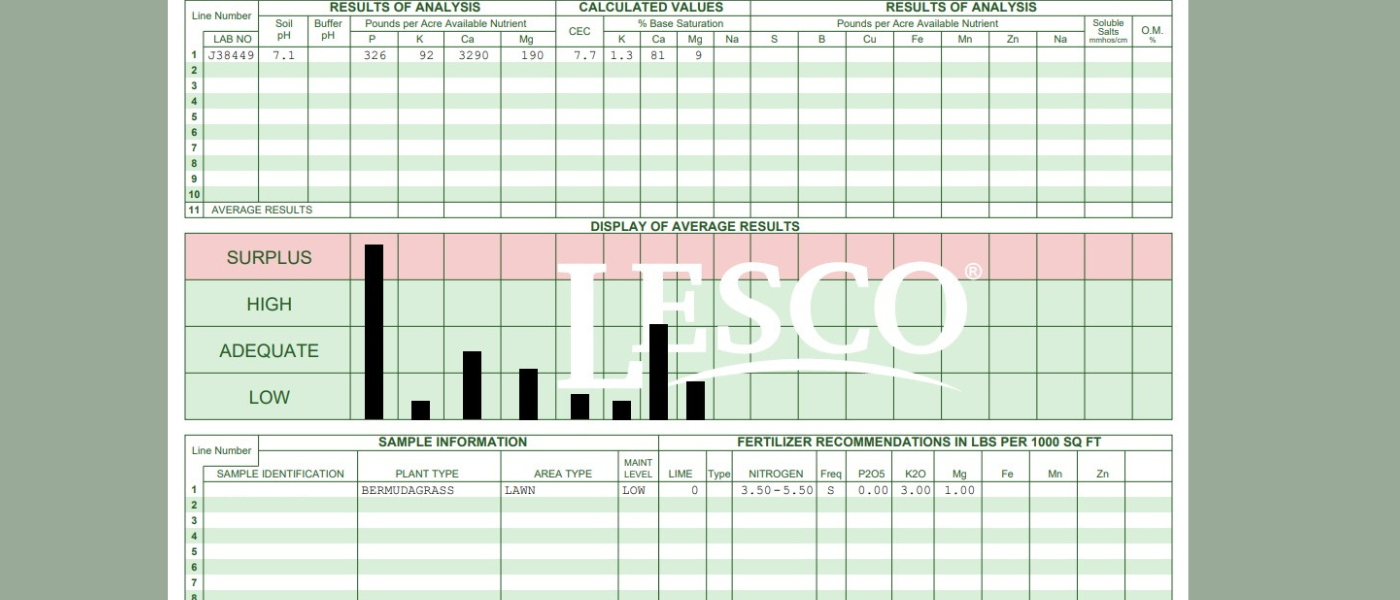How to Read a Soil Test: What You Need to Know
In this guide on how to read a soil test we will go over understanding soil ph, macro and micro nutrients and much more!
Welcome to the world of lush, vibrant lawns in Wilmington, NC! At Vinedresser Lawn and Landscape, we’re not just about mowing and going; we’re about nurturing the ground beneath to ensure your grass thrives in every season. If you’ve ever wondered why some lawns look spectacular while others struggle, the secret often lies beneath the surface. Reading a soil test is crucial to unlocking the potential of your lawn, and we’re here to guide you through every step.
Learn more about our Lawn & Landscape Services In Wilmington, Leland & Hampstead, NC
Section | Key Points | Actionable Advice |
CEC Importance | CEC’s role in nutrient retention and fertilization strategy. | Adapt fertilization for sandy soils with low CEC. |
Soil pH Significance | Soil pH’s impact on nutrient availability and lawn treatment. | Adjust soil pH as needed for optimal growth. |
Macronutrients Role | Nitrogen, Phosphorus, and Potassium’s essential roles. | Customize fertilization based on soil nutrient levels. |
Micronutrients Impact | Importance of Iron, Boron, and Copper for lawn health. | Correct any micronutrient deficiencies identified. |
Soil Deficiencies | How to correct pH imbalances and nutrient deficiencies. | Apply lime or sulfur-based on soil pH levels. |
Organic Matter | Role of organic matter and microbes in nutrient breakdown. | Ensure adequate organic matter for healthy soil. |
Practical Soil Test Insights | Translating soil test numbers into a practical lawn care plan. | Use soil test data for tailored lawn treatment. |
The Importance of Understanding Your Soil
In the quest for the perfect lawn, knowing the ins and outs of your soil’s health is a game-changer. A soil test report, much like a treasure map, reveals the nutrients and conditions present in your soil, guiding us to make informed decisions on lawn fertilization and treatment. But, interpreting this map requires a bit of know-how. Let’s dive into what makes reading a soil test in Wilmington, NC, so vital for your lawn’s success.
Understanding Cation Exchange Capacity (CEC)
First things first when reading your soil test, CEC might sound like a complex term, but it’s essentially your soil’s ability to hold onto essential nutrients. A high CEC means your soil acts as a nutrient bank, releasing what your grass needs over time. For sandy soils common in Wilmington, NC, ideal CEC values typically range from low to moderate due to their texture, usually between 5 and 10 meq/100g. This means that while these soils may not retain nutrients as well as clay or loam soils, understanding and adapting our lawn fertilization strategy is crucial to ensure your lawn receives the necessary nutrients effectively and efficiently.
The Role of Soil pH in Lawn Health
Soil pH isn’t just a number—it’s a crucial indicator of your soil’s health. In Wilmington, NC, achieving the right balance can mean the difference between a thriving lawn and one that struggles. Whether your soil is acidic or alkaline affects everything from nutrient availability to how well your lawn can absorb those nutrients. Reading a soil test helps us pinpoint the pH level and adjust it for optimum grass growth. For optimal health and growth, the ideal pH ranges for common grass types in Wilmington, NC, are as follows:
- Centipede Grass: Prefers slightly acidic soil, with an ideal pH range of 5.0 to 6.0. This tolerance for lower pH levels makes it well-suited for the naturally acidic soils found in many parts of Wilmington, NC.
- Bermuda Grass: Thrives in a slightly wider pH range, ideally between 5.8 and 7.0. Its adaptability to various soil conditions makes Bermuda grass a popular choice for sunny areas.
- Zoysia Grass: Best grows in a pH range of 6.0 to 7.0. Zoysia’s versatility allows it to flourish in slightly acidic to neutral soil conditions, offering a thick, lush lawn.
- St. Augustine Grass: Prefers a slightly acidic to neutral pH, with an ideal range of 5.5 to 7.5. This tolerance allows St. Augustine grass to perform well in a variety of soil types found throughout Wilmington, NC.
Adjusting your soil’s pH within these ideal ranges can significantly improve nutrient uptake, enhance grass vigor, and increase disease resistance, leading to a healthier, more resilient lawn.
Learn more about our Lawn Treatment & Lawn Health Services in Wilmington, Leland & Hampstead NC.

Macronutrients: The Building Blocks of a Healthy Lawn
Every vibrant lawn in Wilmington, NC, owes its success to three key elements: Nitrogen, Phosphorus, and Potassium. Here’s how they contribute:
- Nitrogen fuels growth and gives grass its green color.
- Phosphorus supports strong root development.
- Potassium increases drought resistance and overall hardiness.
By reading a soil test, we can tailor a fertilization plan that ensures your lawn gets exactly what it needs, avoiding the pitfalls of over or under-fertilization. For lawns in Wilmington, NC, the ideal annual application rates of Nitrogen and Potassium per 1,000 sq. ft. for common grass types are as follows:
- Bermuda Grass:
- Nitrogen: 3 to 6 pounds
- Potassium: 1 pound
- Zoysia Grass:
- Nitrogen: 2 to 4 pounds
- Potassium: 1 pound
- Centipede Grass:
- Nitrogen: 1 to 2 pounds (Centipede grass requires less nitrogen than other grasses.)
- Potassium: 1 pound
- St. Augustine Grass:
- Nitrogen: 2 to 4 pounds
- Potassium: 1 pound
These rates ensure that each grass type receives the nutrients it needs for optimal growth, color, and resilience. It’s important to spread these applications evenly throughout the growing season to maintain consistent lawn health and appearance.
Find out more about our Fertilization Services In Wilmington, Leland & Hampstead, NC
Micronutrients and Their Impact
While macronutrients get most of the attention, micronutrients like Iron, Boron, and Copper play supporting roles that are no less important. Iron, for example, is crucial for chlorophyll production. A soil test reveals if your lawn is missing these vital players, allowing us to correct any deficiencies and keep your lawn looking its best.
Addressing Soil Deficiencies and Imbalances
Correcting soil pH and nutrient imbalances is where reading a soil test really shines. In Wilmington, NC, we often encounter sandy soils that require a delicate touch. Whether it’s raising pH with lime or lowering it with sulfur, the test tells us precisely what’s needed for your lawn to flourish.
Organic Matter and Microbial Life: The Unsung Heroes
Did you know that organic matter and soil microbes play a huge role in your lawn’s health? These tiny workers break down nutrients, making them available to your grass. A soil test can indicate if your lawn has enough organic matter and help us decide if we need to add more to boost microbial activity.
Learn more about our Lawn Care in Wilmington, Leland, Hampstead NC.
The Practical Side of Soil Tests
Reading a soil test gives us a wealth of information, from nutrient levels to pH balance. But it’s not just about numbers; it’s about translating those numbers into a practical plan for your lawn. In Wilmington, NC, we use this data to customize a fertilization and treatment program that targets your lawn’s specific needs, ensuring it looks its best year-round.
Understanding how to read a soil test is crucial for any lawn care strategy, especially in Wilmington, NC. At Vinedresser Lawn and Landscape, we pride ourselves on our expertise in interpreting these tests and applying their insights to bring out the best in your lawn. Whether you’re battling sandy soil, pH imbalances, or nutrient deficiencies, we have the knowledge and experience to make your lawn thrive.
Why Choose Us?
Choosing us means partnering with experts who are passionate about creating healthy, beautiful lawns through science-based strategies and personalized care. Reading a soil test in Wilmington, NC, and acting on its findings is just the beginning. Our commitment to your lawn’s health and your satisfaction drives everything we do.
Are you ready to unlock the full potential of your lawn? Let’s make reading your soil test in Wilmington, NC, the first step toward a lush, vibrant outdoor space. Contact Vinedresser Lawn and Landscape today to to get your soil right.
